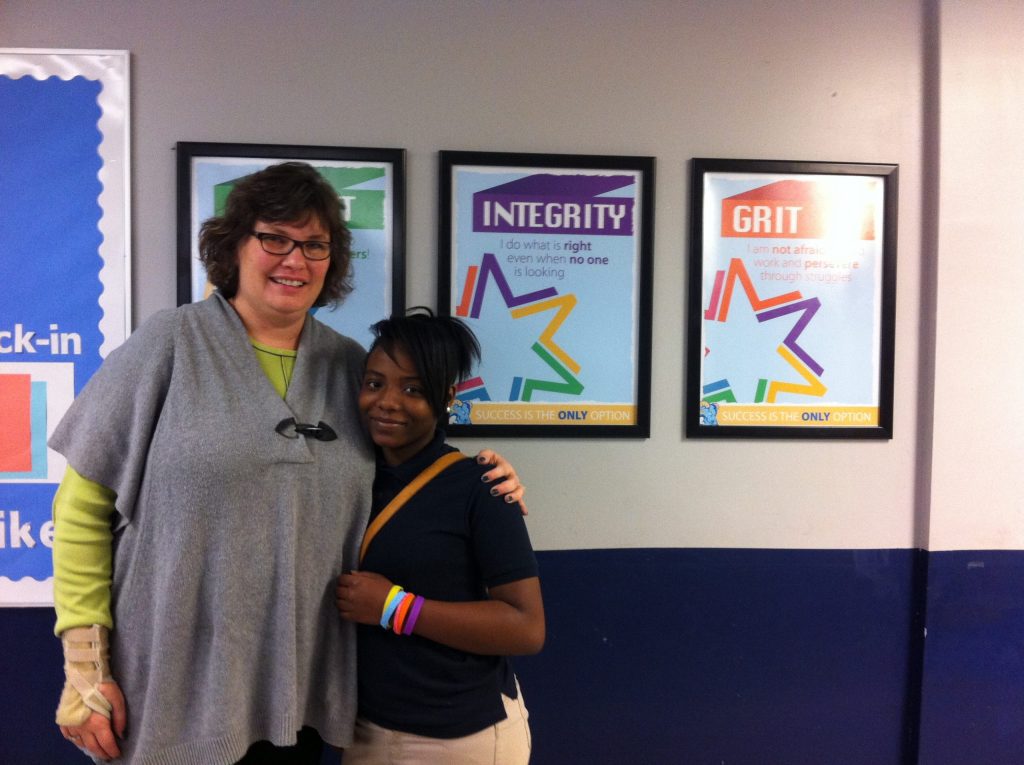Amya at the Institute of Technology and Academics
| Share this post: |
Far across town from the Institute of Technology and Academics, lives a 15-year-old girl who has been in desperate straits. Her parents struggle with drug addiction, she cannot read and she has resorted to cutting herself to cope with her unhappy life.
Things are changing for her, though, and it is all because of one confident, big-hearted eighth-grader at ITA who can relate to her friend’s life, but can see a better one on the horizon. This eighth-grader is Amya, and she has become the confidant, counselor and friend of this desperate teen who has looked to her younger neighbor for salvation from a destitute life. You could say Amya already is becoming the professional social worker she aspires to be.

“We would sit around and tell each other stories about our lives,” says a mature Amya. “I decided to grow from it, and not let anything hold me back. This girl was smoking weed, she couldn’t read and she was cutting herself. I told her she had to stop. That was the first step. Then, I told her to see her principal and tell her she needed help.”
The advice is working.
“This girl is trying to be better,” Amya says.
Go to the principal. Tell her the problem. Trust someone will help. Amya is living proof that this advice will yield a new perspective on life. Six years ago, the 14-year-old entered the Institute of Technology and Academics on Milwaukee’s far north side as a third-grader. Attending the private school was a possibility through the Milwaukee Parental Choice Program. “I was a TROUBLE student,” admits Amya. What, exactly, is a TROUBLE student?
“I disrespected everyone. I didn’t do my work. I was fighting all of the time. I wasn’t here for the school, but to be cool and do stuff that shouldn’t happen,” she says candidly. But the principal, Kimberly Taylor, offered encouragement and a refuge that Amya, who has weathered repeated homelessness, did not have anywhere else.
“Ms. Taylor is like another mom. She took me under her wing and has been like a mother that I have never had,” Amya says. She is quite open about her family struggles. “My family is a little crazy. We have been homeless a lot of times. My mother and I don’t get along,” she explains. “But I don’t regret that; I don’t think I would be as strong as I am.”
“At our house we don’t show a lot of affection even though we love each other.” She says….”But here there is a lot of love. I have a family here at ITA, Mrs. Taylor, Ms. Stenvig- they are my family, a lovable family”
This transformation from a TROUBLE student to the leader Amya is today did not happen overnight. “In third grade and even fourth grade, I was bad. In fifth grade, I decided I was going to make my teacher quit. I was so bad,” she admits. “But, she never gave up on me. She made me stay after school, day after day. She told me she believed in me. Nobody ever believed in me before.
“I learned we grew up in similar lives, and she told me that when I need anything, she will help me. She has,” Amya says. Trouble, doubt, trust and belief – all mixed up together in the classrooms of ITA and in Amya’s life. Out of that, resilience and courage to aspire to something better took ahold of Amya. She plays with five, colorful, rubber wristbands on her arm. Each one is stamped with a character trait. Traits that Ms. Taylor says she finds in Amya: integrity, grit, reflection, compassion, respect. Amya wears them proudly since the previous week’s assembly, when she received them in front of her classmates.
“I’m all about being a leader,” she says. “I want to encourage my classmates to do the right thing, and not fall into a mess. I stay out of the drama. I try to be a positive role model.”
When the older students get 15 minutes of social time each day – time to talk with their friends or use social media, Amya travels downstairs to the third-grade class to help with reading or spelling, or whatever their teacher asks her to do. She goes back to her starting point, perhaps not to forget. Small-group instruction and extra tutoring is what helped her excel. “I was one of the students who couldn’t do a whole lot in reading and math,” quickly adding that last year she leaped two years’ worth of subject material to rise to her current eighth-grade proficiency level.
While her principal is certainly proud of Amya’s academic growth, that is not her best accomplishment. “The biggest thing I see is how she has taken everything outside of school to pass it on,” remarks Taylor. Amya’s family moved more than 22 miles from school last spring to an area near Mitchell International Airport. They live in a housing project, where “there are a lot of kids who are depressed and hurt themselves,” Amya says.
“I love to help people,” she adds. “There are little kids and teenagers who don’t set any examples for them. So last summer, I started a program on Mondays and Wednesdays. I started handing out lunches, and then teaching some Bible classes and reading to the little kids. The adults who run the nearby lunch program offered Amya toys and books to use in her program. They were so impressed with her determination, that she will be hosting a Christmas event in a few weeks for neighborhood children.
“I’ve got a lot of supporters,” she says, adding, “I’ll continue again in the summer.” While the school may be the Institute of Technology and Academics, that can’t be the starting point to help lift up the students who attend, Taylor says. “The number-one thing kids may need at this school is a sense of family. Their basic needs are more vital than multiplication.”
Amya is not the only student with a parent who struggles to provide a family life for her children. There are many others who do not have homes where they feel they matter, where there are consequences for poor decisions, where there is a sense of character. The school stresses character twice a week. They learn about valuable characteristics to which most people aspire. This is the starting point for true education, Taylor says.
“So many of our kids are used to disappointment,” she adds. “I keep telling the teachers that consequences matter to our children. They are expecting it. These are the things that show them you love them.” While school Founder and Executive Director Kulbir Singh started the Institute to offer disadvantaged students 21st Century technology and strong academics, he admits that the most valuable asset the school gives its students is a stable family atmosphere and loving heart. “That,” he says as Amya leaves the room, “is a living example of what we are and what we want to accomplish. All of this is not possible without the staff. Kim and her teachers are our biggest asset. They care.”
“Our kids are gifted with an ability to see through adults,” Taylor quickly responds. “Turning around test scores doesn’t happen in two years. It’s not a quick process. If you’re really going to change a child’s life, you have to be there for the long-term. It takes years to do what we need to do, time to prove to them we truly care. “I tell my new teachers that this is not Freedom Writers or Stand Up and Deliver. It’s a tough duty, and the results don’t come in a month. But with patience, they do come.
“That’s the beauty of it all,” Taylor says. “These kids are so great. How do they get to be so resilient? How do they end up like Amya, taking just what we hope to instill here out into the world? Our kids have a lot to offer.”
No doubt, Amya will offer the world much. She already has.
| Share this post: |
 Skip to content
Skip to content